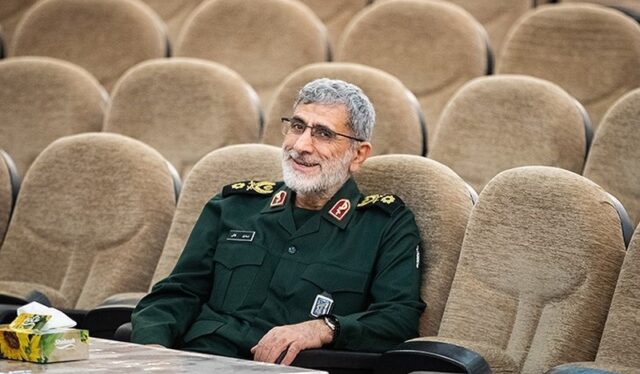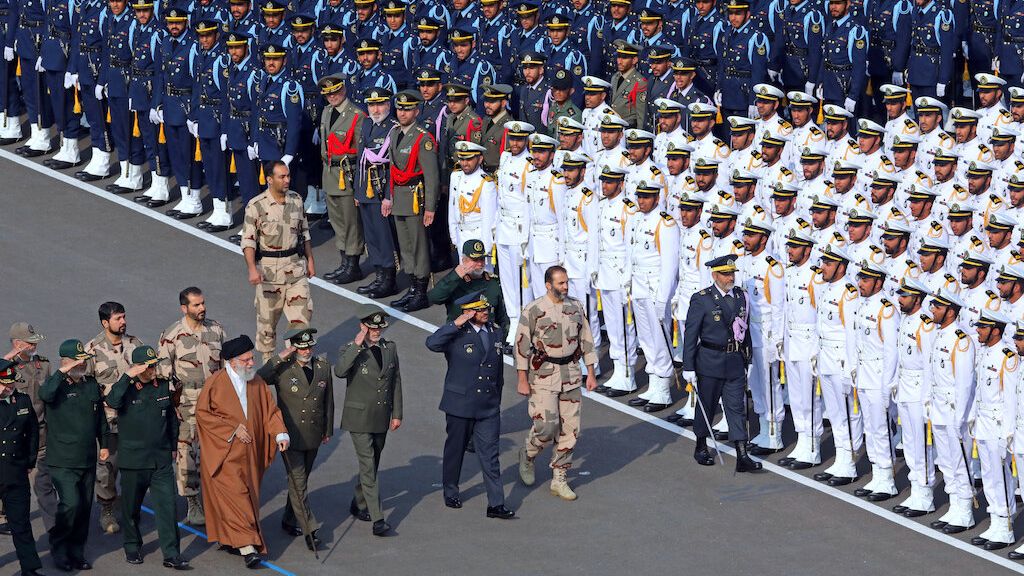Kurdish media reported that on the night of November 20-21, the Islamic Revolutionary Guards Corps attacked the Kurdish mountainous northern part of Iraqi territory. The most powerful strike was directed at Erbil, the capital of Iraqi Kurdistan. The strike was directed again against the Kurdish military-political leadership.
The Revolutionary Workers of Iranian Kurdistan Organization (Komala) and the Democratic Party of Iranian Kurdistan (PDKI) admitted that their buildings were damaged. The information was confirmed by the state-run Iraqi news agency INA, which said that ballistic missiles and loitering munitions had hit targets in Iraq.
The governor of Kuy Sanjak in Irbil muhafaz, Tarik Haidari, told Kurdistan 24 that three missiles had hit the city, which were probably fired from a combat unmanned aerial vehicle. Two landed near the health center at Camp Azadi, and one hit buildings used by the PDKI. The Kurdish human rights organization Hengaw determined that two drones aimed at the Baharka camp (owned by the PDKI) in Irbil reached their target, but there were no casualties. The director of the international airport in the capital of Iraqi Kurdistan, Ahmed Hoshjar, denied rumors about the suspension of flights.
Reports of Iranian ballistic missile & drone attacks on Kurdish opposition groups in Erbil, Iraq. pic.twitter.com/ddQZyByYaj
— Faytuks News Δ (@Faytuks) November 20, 2022
In Sulaymaniyah, buildings belonging to the Komala organization were hit again. The attack did not spare the Janikan refugee camp near Irbil. The US Central Command, responsible for US military operations in the Middle East, condemned the “illegal” Iranian strikes.
“Indiscriminate and illegal attacks pose a threat to civilians, violate Iraqi sovereignty and threaten the won security and stability of Iraq and the Middle East,” CENTCOM chief General Michael Kurilla said.
At least two drones target bases of Iranian-Kurdish opposition groups near Erbil province’s Bahrka – Ore Mountains
[Pictures from Erbil] pic.twitter.com/QrwNFyTGnh
— Faytuks News Δ (@Faytuks) November 20, 2022
The attacks carried out on the night from Sunday to Monday are the second such incident in a week. Iran attacked areas along the border, resulting in the death of one Peshmerga militia member and the wounding of several others. At the time, Iraqi Foreign Minister Fuad Hussein, in a telephone conversation with his Iranian counterpart Hossein Amir-Abdollahian, condemned the attacks as a violation of Iraq’s sovereignty and warned that the continuation of such unilateral actions was “dangerous.” The Iranian aggression was also condemned by the Prime Minister of the Kurdistan Autonomous Region, Masrour Barzan.
The IRGC has released footage of its Monday attacks against the positions of Kurdish dissident groups in the Iraqi Kurdistan. pic.twitter.com/fkK0txXGTD
— Iran International English (@IranIntl_En) November 14, 2022
So far, according to available data, attacks on Kurdish-populated territory in Iraq since September 28 have resulted in the deaths of at least thirteen people, including nine in the first strike. At least several dozen people were injured. According to Kurdish sources, the number of victims reached as high as eighteen, including two women and a child. This is certainly not the end, as Iran has threatened to carry out further operations against Kurdish groups if they are not disarmed and dispersed. Tehran has accused Kurdish-Iranian opposition groups of fomenting unrest in the country and has warned that as long as such support continues, there is no chance of stopping the cyclical shelling.
Incitement to anti-government protests in Iran and the smuggling of weapons into the country, which allows resisting the security forces, is to be punished severely and without exception. The problem is that Tehran has not provided evidence to support these allegations, which Kurdish groups have vehemently denied. Sources working with the Ghods Forces maintain that the conspirators – as members of the Kurdish parties are described – suffer heavy material and human losses. Kurdish groups deny.
Erbil tonight.#Iraq #Kurdistan pic.twitter.com/ac0THxcLPR
— Tammuz Intel (@Tammuz_Intel) November 20, 2022
Stability in Iraqi Kurdistan and the level of security have recently been significantly reduced, as the Turkish Air Force carried out parallel airstrikes on Kurdish fighters. For the Kurds, this is a time of increased risk. It is worth noting that the Pasdarani have yet to escalate, striking directly at the infrastructure used by the militants, not at or at least targeting civilian facilities.
Last week, the head of the Ghods Force, Esmail Ghaani, made an unannounced two-day visit to Baghdad, which could be read as a form of warning. The head of the elite Pasdaran troops warned not only the Kurdish authorities, but also the Iraqi leaders. It is not clear how serious the warning is, but it puts Baghdad in an embarrassing position. This is the first time Iranian officials have publicly threatened a ground operation. It is not entirely clear what form the Iranian call to disarm opposition groups operating in neighboring territory took. It was probably a request, not a formal note or ultimatum.
Farewell kiss of a mother to her son murdered by the regime.
16-year-old #KarwanQaderShokri from #Piranshahr was killed by the Islamist regime.
In the background, people chant “we will take your revenge”
Iranians are sacrificing their lives for freedom #IranRevoIution pic.twitter.com/37ilf9io8h
— Masih Alinejad 🏳️ (@AlinejadMasih) November 21, 2022
During this visit, Ghaani met with representatives of the Coordination Framework, which is dominated by Shia pro-Iranian forces, including President Abdul Latif Rashid elected in October and Prime Minister Muhammad al-Sudani. He must have made it clear to them that Tehran would no longer tolerate the Iraqi government’s behavior of allowing the building of bases and training camps, infiltration of Iranian territory, arms shipments, or fomenting unrest.
For the state of the ayatollahs, militants in Iraqi Kurdistan have been a threat since the Iran-Iraq war. Now – which has a significant connection with the protests that are burning Iran red – they have grown even more powerful. Kurdish camps can be a refuge and asylum for protesters and allow militants to regroup. Hence the recent attacks: to force them to leave their safe places and move to the mountains, which are safer for them.
According to unofficial information, if Baghdad does not comply with the demands, Iran will launch ground forces and continue bombing the bases. Baghdad has repeatedly admitted that there is no evidence of contraband being smuggled into Iran across the border, but Tehran does not seem to believe this and is threatening – we know it – to launch something like a special military operation.

Esmail Ghaani.
(Erfan Kushari)
The fact is that Kurdish bases have been established in the northern part of Iraq, where militia members train and use weapons freely, claiming that they are taking only defensive actions. Related to the Kurds issue is the Mossad issue. The Pasdarani believe that these areas are heavily infiltrated by Mossad agents who work closely with the militants and political leadership, and that this cooperation is aimed at Iran.
Like a boomerang, the attack from March returns, when Fateh-110 missiles were launched from Iranian Khasabad in the last East Azerbaijan. So far, this has not been confirmed, but they may have been intended for the estate of Baz Karin, a Kurdish oil magnate and alleged Mossad collaborator. The Iranian Foreign Minister Hossein Amirabdollahian, however, goes further and believes that the cooperation of the Kurds, the Mossad and, of course, Western powers is aimed at bursting Iran from within by leading to a civil war and the disintegration of the state, and in the best configuration – its marginalization in the Middle East.
See also: Australian destroyer entered San Diego with two dead cetaceans under the hull
khamenei.ir

